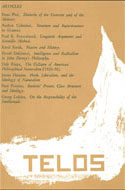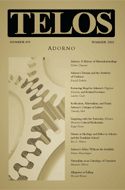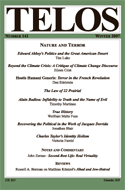By Lukas Szrot · Tuesday, March 24, 2015  Given the rich and diverse history in the discipline of philosophy, many a practicing philosopher might justifiably remark that insightful philosophical inquiry must withstand the test of time. Though “The Collapse of Philosophical Naturalism” was published in Telos in 1969, many of its insights remain highly relevant to conversations that continue in philosophical and sociopolitical circles today. Dale Riepe issues a damning critique, examining four at once distinct and kindred flaws in philosophical naturalism. Given the rich and diverse history in the discipline of philosophy, many a practicing philosopher might justifiably remark that insightful philosophical inquiry must withstand the test of time. Though “The Collapse of Philosophical Naturalism” was published in Telos in 1969, many of its insights remain highly relevant to conversations that continue in philosophical and sociopolitical circles today. Dale Riepe issues a damning critique, examining four at once distinct and kindred flaws in philosophical naturalism.
Continue reading →
By Eric S. Nelson · Friday, July 15, 2011 Eric S. Nelson’s “Revisiting the Dialectic of Environment: Nature as Ideology and Ethics in Adorno and the Frankfurt School” appears in Telos 155 (Summer 2011). Read the full version online at the Telos Online website, or purchase a print copy of the issue in our store.
 As a contribution to a responsive and critical materialist ethics of environments and animals, this essay reexamines the significance of nature and animals in the critical social theory of Theodor Adorno. In response to the anthropocentric stance of intersubjective discourse and recognition in recent figures associated with the Frankfurt School, such as Jürgen Habermas and Axel Honneth, I argue for the ecological import of the aporetic dialectic of nature and society in Adorno and Horkheimer’s Dialectic of Enlightenment and Adorno’s later works. Adorno’s continuing confrontation with the “domination of nature” traces the tensions between the ideological construction and resistance of “nature” as well as the instrumentalization and implicit disruptive promise of sensuous life. These tensions indicate the material and bodily bonds between human and animal happiness and suffering and the ambiguous role of mimesis in both domination and emancipation. Adorno insisted on the critical prospect of an unforced and non-coercive freedom that brings us toward the object and responsibility for socially and historically mediated and non-identical natural life. As a contribution to a responsive and critical materialist ethics of environments and animals, this essay reexamines the significance of nature and animals in the critical social theory of Theodor Adorno. In response to the anthropocentric stance of intersubjective discourse and recognition in recent figures associated with the Frankfurt School, such as Jürgen Habermas and Axel Honneth, I argue for the ecological import of the aporetic dialectic of nature and society in Adorno and Horkheimer’s Dialectic of Enlightenment and Adorno’s later works. Adorno’s continuing confrontation with the “domination of nature” traces the tensions between the ideological construction and resistance of “nature” as well as the instrumentalization and implicit disruptive promise of sensuous life. These tensions indicate the material and bodily bonds between human and animal happiness and suffering and the ambiguous role of mimesis in both domination and emancipation. Adorno insisted on the critical prospect of an unforced and non-coercive freedom that brings us toward the object and responsibility for socially and historically mediated and non-identical natural life.
Continue reading →
By Russell A. Berman · Saturday, December 29, 2007 Telos 141: Nature and Terror is available in our store.
 Classical figures of thought endure. A long-standing image of the health of nature contrasts the bucolic landscape with the corruption of the city, where violence abounds. The only security is a natural way of life, far from the brutal metropolis—until nature turns out to be a threat, and we succumb to the uncontrollable fear named for that destructive god: panic. The state of nature is the homeland of violence, its only law the law of the jungle, as we scurry back to the city to find security—until it morphs into the security state. Critical Theory described this dynamic as a sometimes too narrow narrative of domination: the human mastery of nature, in the interest of self-preservation, turns into the mastery of humanity by an encompassing machinery of control. This is an old story, but it comes to us anew in this political season, in which nature and terror—the anxieties about the environment and fear of terrorism, as well as the reaction to it—haunt us, in public and in private. Classical figures of thought endure. A long-standing image of the health of nature contrasts the bucolic landscape with the corruption of the city, where violence abounds. The only security is a natural way of life, far from the brutal metropolis—until nature turns out to be a threat, and we succumb to the uncontrollable fear named for that destructive god: panic. The state of nature is the homeland of violence, its only law the law of the jungle, as we scurry back to the city to find security—until it morphs into the security state. Critical Theory described this dynamic as a sometimes too narrow narrative of domination: the human mastery of nature, in the interest of self-preservation, turns into the mastery of humanity by an encompassing machinery of control. This is an old story, but it comes to us anew in this political season, in which nature and terror—the anxieties about the environment and fear of terrorism, as well as the reaction to it—haunt us, in public and in private.
Continue reading →
|
|
 Given the rich and diverse history in the discipline of philosophy, many a practicing philosopher might justifiably remark that insightful philosophical inquiry must withstand the test of time. Though “The Collapse of Philosophical Naturalism” was published in Telos in 1969, many of its insights remain highly relevant to conversations that continue in philosophical and sociopolitical circles today. Dale Riepe issues a damning critique, examining four at once distinct and kindred flaws in philosophical naturalism.
Given the rich and diverse history in the discipline of philosophy, many a practicing philosopher might justifiably remark that insightful philosophical inquiry must withstand the test of time. Though “The Collapse of Philosophical Naturalism” was published in Telos in 1969, many of its insights remain highly relevant to conversations that continue in philosophical and sociopolitical circles today. Dale Riepe issues a damning critique, examining four at once distinct and kindred flaws in philosophical naturalism.  As a contribution to a responsive and critical materialist ethics of environments and animals, this essay reexamines the significance of nature and animals in the critical social theory of Theodor Adorno. In response to the anthropocentric stance of intersubjective discourse and recognition in recent figures associated with the Frankfurt School, such as Jürgen Habermas and Axel Honneth, I argue for the ecological import of the aporetic dialectic of nature and society in Adorno and Horkheimer’s Dialectic of Enlightenment and Adorno’s later works. Adorno’s continuing confrontation with the “domination of nature” traces the tensions between the ideological construction and resistance of “nature” as well as the instrumentalization and implicit disruptive promise of sensuous life. These tensions indicate the material and bodily bonds between human and animal happiness and suffering and the ambiguous role of mimesis in both domination and emancipation. Adorno insisted on the critical prospect of an unforced and non-coercive freedom that brings us toward the object and responsibility for socially and historically mediated and non-identical natural life.
As a contribution to a responsive and critical materialist ethics of environments and animals, this essay reexamines the significance of nature and animals in the critical social theory of Theodor Adorno. In response to the anthropocentric stance of intersubjective discourse and recognition in recent figures associated with the Frankfurt School, such as Jürgen Habermas and Axel Honneth, I argue for the ecological import of the aporetic dialectic of nature and society in Adorno and Horkheimer’s Dialectic of Enlightenment and Adorno’s later works. Adorno’s continuing confrontation with the “domination of nature” traces the tensions between the ideological construction and resistance of “nature” as well as the instrumentalization and implicit disruptive promise of sensuous life. These tensions indicate the material and bodily bonds between human and animal happiness and suffering and the ambiguous role of mimesis in both domination and emancipation. Adorno insisted on the critical prospect of an unforced and non-coercive freedom that brings us toward the object and responsibility for socially and historically mediated and non-identical natural life.  Classical figures of thought endure. A long-standing image of the health of nature contrasts the bucolic landscape with the corruption of the city, where violence abounds. The only security is a natural way of life, far from the brutal metropolis—until nature turns out to be a threat, and we succumb to the uncontrollable fear named for that destructive god: panic. The state of nature is the homeland of violence, its only law the law of the jungle, as we scurry back to the city to find security—until it morphs into the security state. Critical Theory described this dynamic as a sometimes too narrow narrative of domination: the human mastery of nature, in the interest of self-preservation, turns into the mastery of humanity by an encompassing machinery of control. This is an old story, but it comes to us anew in this political season, in which nature and terror—the anxieties about the environment and fear of terrorism, as well as the reaction to it—haunt us, in public and in private.
Classical figures of thought endure. A long-standing image of the health of nature contrasts the bucolic landscape with the corruption of the city, where violence abounds. The only security is a natural way of life, far from the brutal metropolis—until nature turns out to be a threat, and we succumb to the uncontrollable fear named for that destructive god: panic. The state of nature is the homeland of violence, its only law the law of the jungle, as we scurry back to the city to find security—until it morphs into the security state. Critical Theory described this dynamic as a sometimes too narrow narrative of domination: the human mastery of nature, in the interest of self-preservation, turns into the mastery of humanity by an encompassing machinery of control. This is an old story, but it comes to us anew in this political season, in which nature and terror—the anxieties about the environment and fear of terrorism, as well as the reaction to it—haunt us, in public and in private. 






